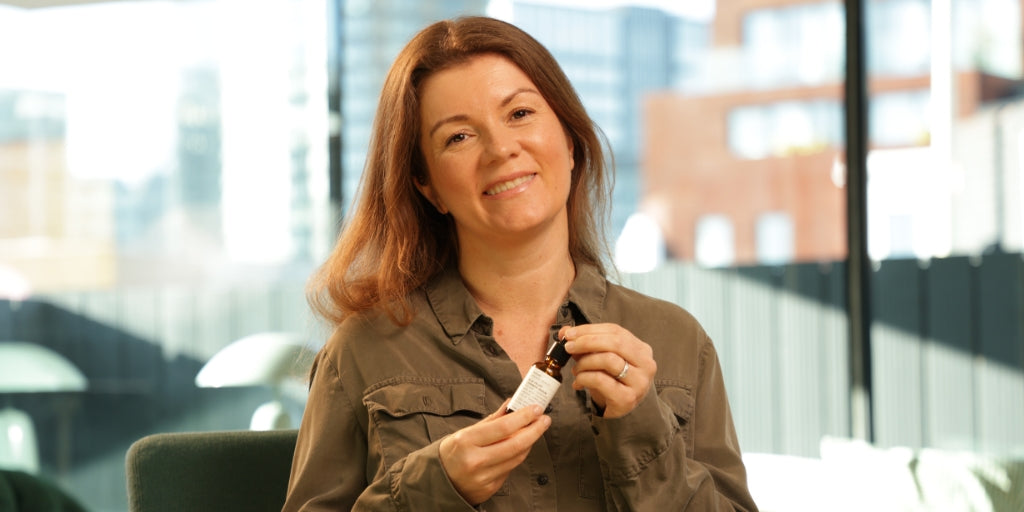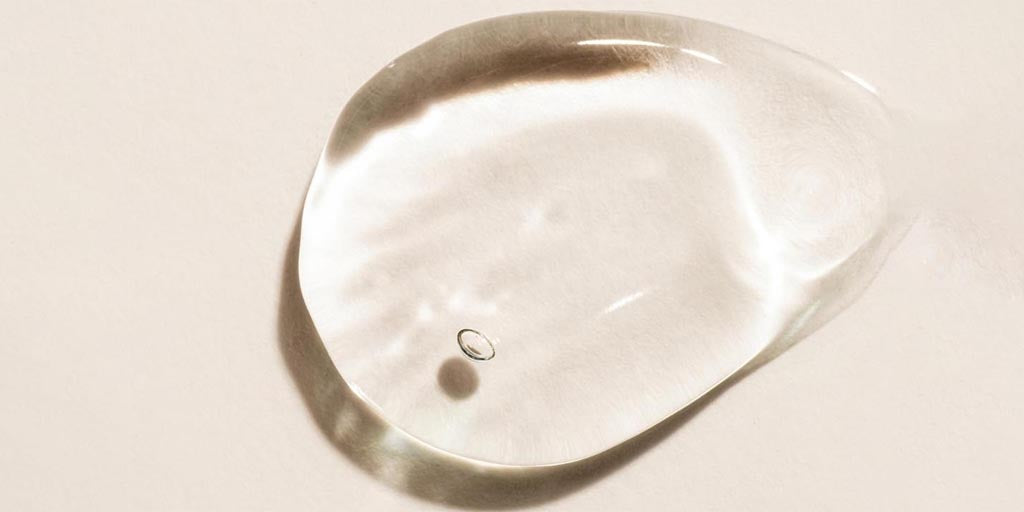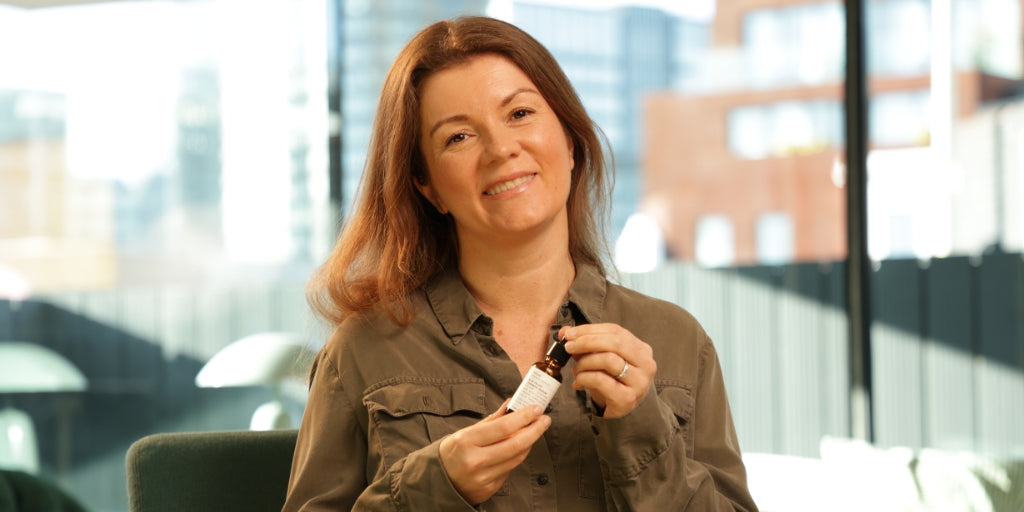Finding the right products to give you healthy, gorgeous skin is important at any age, but especially when we go through key life changes.. I’m in my mid 40’s now and I’m really interested in how changing hormones impact my skin and overall wellbeing. I wanted to share how menopause affects our skin and what we can do to help it look and feel its best. I’ve created a series of natural and organic skincare products designed to support your skin during menopause which I will share with you in this blog.

Menopausal Skin Saviours made with natural and organic ingredients to support your skin.
How menopause affects our skin
When women go into menopause, hormone levels of oestrogen, progesterone, testosterone and growth hormone drop which can cause skin changes.
Oestrogen helps to stimulate the production of collagen and elastin and also the production of Hyaluronic Acid and Ceramides as well as somewhat protecting against ageing due to UV damage¹. When oestrogen levels drop it can cause skin ageing, wrinkles, loss of firmness, skin thinning, larger pores and dehydrated skin². Cellular turnover also declines in many women which makes skin more dull.
Progesterone helps to stimulate sebum production in the skin, which is why our skin glows in pregnancy when levels of progesterone are higher than usual. Progesterone is also relaxing for the body and aids with sleep. In the perimenopause, progesterone levels often drop before oestrogen. This can cause skin to be drier and more sensitive. Low progesterone can also cause problems with sleep which can affect skin.
We’ve got lots of solutions for these issues coming up so read on to find out more about how you can support your skin throughout menopause and also help with any sleep issues.

What are common skin conditions with menopause?
Flushing is common in 75% of menopausal women, and this is known to exacerbate rosacea although the exact relationship is unknown.
Reduction in the skin’s barrier function can lead to an increase in eczema and itchy redness prone skin in menopausal women.
Having low progesterone in relation to oestrogen (which happens in early perimenopause) can also cause an excess of androgens and testosterone, which can sometimes cause acne and skin breakouts³.
How can I improve my skin during menopause?
Choosing the right products can make a real difference to skin, and how it looks and feels during the menopause. Here are my recommendations on the key tactics you should use to help improve your skin during the menopause:
As skin can age rapidly when hormone levels drop, look for skin care formulated for mature skin that helps replenish collagen and elasticity and firm and lift the skin. To avoid ageing, also look for products that can protect the skin from UV damage and environmental stress.
As cellular turnover decreases during menopause, look for skincare designed to enhance cellular turnover and boost skin radiance.
As the skin’s barrier layer is often disrupted during menopause, making the skin drier and more sensitive, use skincare designed to replenish the skin’s barrier and rehydrate the skin.

What are the best skincare ingredients to use for menopausal skin?
Here are my recommendations for the best active ingredients you should look for in menopause skincare:
Hydrating ingredients like Hyaluronic Acid
Hyaluronic Acid is naturally produced in the skin as one of the building blocks of skin and can hold over 1000 times its weight in moisture. When menopause happens, Hyaluronic Acid levels in the skin drop. We can replenish Hyaluronic acid levels in the skin to boost skin hydration levels.

Peptides and amino acids for firmness
Peptides are small components of proteins that can stimulate collagen and improve skin elasticity to make skin look more youthful and reduce the appearance of wrinkles. At Evolve Organic Beauty we use several clinically proven peptides which come from natural sources such as Sacha Inchi seeds and coconut. We also use a patented Amino Acid which has been clinically proven to reduce the appearance of wrinkles, lift and firm the skin.

Bio-Retinol for a youthful complexion
Cellular turnover drops in menopause which can cause skin to look dull. Bio-Retinol can help to improve cellular turnover, improve skin firmness and reduce dark spots. Bio-Retinol is a natural plant based alternative to Retinol which does not cause skin irritation. At Evolve Organic Beauty we use two Bio-Retinols from Bidens pilosa and Bakuchiol which are clinically proven to help with cellular turnover, radiance and age spots.

Use calming skin care on sore, redness prone skin
Soothing ingredients like the medicinal mushroom Chaga and the amino acid Ectoin help to soothe irritated skin, reduce redness and support healthy circulation and rosacea prone skin.
Avoid any irritating ingredients such as synthetics and choose natural ingredients. I also recommend avoiding using synthetic fragrances as these can both be irritating and can affect hormone levels because they act as hormone mimics in the body.

Ceramides to create a protective barrier and retain moisture
Look for ingredients that can help to replenish the skin’s protective barrier layer which can be weaker during menopause. Ceramides are clinically proven to reduce water loss in the skin and replenish the skin’s barrier layer. Prebiotics can also help to rebalance the friendly bacteria on the skin’s surface that contribute to the skin barrier layer.

Vitamin C to combat age spots and pigmentation

Salicylic acid to combat hormonal acne
If you are suffering from hormonal acne, look for products with Salicylic Acid which can help to remove clogs, balance bacteria and soothe redness.

What are the best menopause skincare products?
What face cleanser is good for menopausal skin?
Choose a mild face cleanser which does not strip the skin of moisture or irritate.
My favourite is the Evolve Organic Beauty Gentle Cleansing Melt which is nourishing for sensitive menopausal dry skin.

What is the best hydrating mist for menopausal skin?
After cleansing, try using a water based hydrating mist to cool down flushed skin and boost hydration. Our Age Defying Hydrating Face Mist contains soothing and hydrating Resurrection plant molecule and Hyaluronic acid to add moisture to dry menopausal skin. It also refreshes skin with organic Rosewater.


What is the best facial serum for menopausal skin?
I like to use a range of different serums to meet my menopausal skin’s needs. I often layer my serums on top of eachother and also vary them depending on the season and how my face feels.
I start with the Hyaluronic Serum 200 which helps to restore Hyaluronic Acid in the epidermis and help plump dehydration lines. Every 30ml bottle has 200mg of concentrated natural Hyaluronic Acid blended with organic Rosewater and Pomegranate extract.

Next I like to use a collagen boosting serum. At the moment I am loving our new Age Defying Lifting Serum which contains anti ageing Peptides and glycoproteins which help to boost collagen production and elasticity, lift and firm and reduce the appearance of wrinkles.


To replenish my skin barrier layer in the winter or when my face feels dry, I like to use our Blue Velvet Ceramide Serum. This helps to reduce dry skin with natural ceramides and olive squalane.

Rosehip Miracle oil is another of my favourite face oils. It has a beautiful lightweight texture and is made with Organic Rosehip oil and Nigella oil, which help to nourish menopausal dry skin and reduce irritation.

What are the best moisturisers for menopausal skin?
It is important to choose a moisturiser that will hydrate, restore and avoid water loss. I’ve created a series of natural and organic face creams that do just this. Here are my recommendations for the best moisturisers for menopausal skin:
Multi-Peptide 360 Anti-Ageing Cream is a rich moisturiser suitable for daily use on the face and neck for nourishing dry, menopausal skin.
Pro+ Ectoin Soothing Cream effectively calms and soothes sensitive skin prone to redness, in a lightweight fragrance-free cream. It contains soothing Ectoin and Chaga mushroom to support redness prone, rosacea prone skin.
Our night cream the Nightly Renew Facial Cream not only contains the renewing benefits of Bio-Retinol from Bidens pilosa, it also helps detoxify while you sleep and contains a fragrance proven to improve sleep quality to help you wake looking rested and refreshed.
What is the best facial treatment for menopausal skin?

How to protect menopausal skin
To protect menopausal skin it is important to choose products made with ingredients that guard against UV, blue light and pollution. I recommend wearing a broad spectrum daily sunscreen. I formulated our Climate Defence Facial Cream SPF 30 to give a high level of UVA and UVB protection, as well as hydrating the skin thanks to natural Hyaluronic Acid.
What products can be used to promote a good night's sleep?
In the perimenopause, progesterone levels often drop first which can cause sleep disruptions and that can have a knock on effect on the skin.
Using a nourishing night cream for the face and neck can help revitalise skin. As I often experience sleep disruption, I designed our Nightly Renew Facial Cream to include a natural fragrance proven to improve sleep quality and to help you fall asleep more quickly. It has helped me and my skin have a good night’s sleep.

Finding the right products to give you healthy, gorgeous skin is important at any age, but especially when we go through key life changes.. I’m in my mid 40’s now and I’m really interested in how changing hormones impact my skin and overall wellbeing. I wanted to share how menopause affects our skin and what we can do to help it look and feel its best. I’ve created a series of natural and organic skincare products designed to support your skin during menopause which I will share with you in this blog.
¹ Thornton MJ. Estrogens and aging skin. Dermatoendocrinol. 2013 Apr 1;5(2):264-70. doi: 10.4161/derm.23872. PMID: 24194966; PMCID: PMC3772914.
² Stevenson S, Thornton J. Effect of estrogens on skin aging and the potential role of SERMs. Clin Interv Aging. 2007;2(3):283-97. doi: 10.2147/cia.s798. PMID: 18044179; PMCID: PMC2685269.
³ Kamp E, Ashraf M, Musbahi E, DeGiovanni C. Menopause, skin and common dermatoses. Part 2: skin disorders. Clin Exp Dermatol. 2022 Dec;47(12):2117-2122. doi: 10.1111/ced.15308. Epub 2022 Oct 26. PMID: 35727900; PMCID: PMC10092853.







